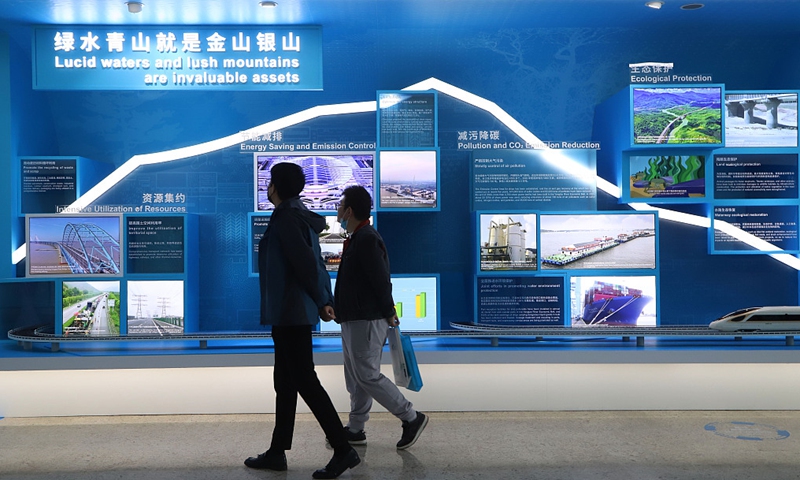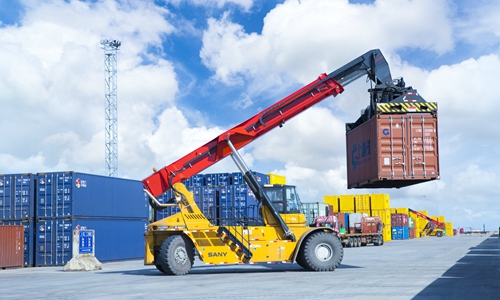
Visitors enjoy an exhibition held on Monday in anticipation of the opening of the the Second United Nations Global Sustainable Transport Conference in Beijing on Thusrday. Photo: CFP
Chinese President Xi Jinping announced on Thursday that China will establish a Global Innovation and Knowledge Center for Sustainable Transport and develop a green and digital Belt and Road Initiative at a faster pace, as part of the country's broad contributions to the development of global sustainable transport.
Xi made the announcement while addressing the opening ceremony of UN Global Sustainable Transport Conference, which kicked off in Beijing and online on Thursday. The conference came just two days after the leaders' summit of the 15th meeting of the Conference of the Parties to the Convention on Biological Diversity that kicked off in Kunming, Southwest China's Yunnan Province - underscoring China's growing role and contributions to tackling critical global issues.
In his speech on Thursday, Xi highlighted major changes and serious challenges caused by the COVID-19 pandemic to the global economy and people's lives and called for global cooperation in addressing issues in the transport sector.
"It is imperative that we follow the prevailing trend of world development, advance global transport cooperation, and write a new chapter featuring connectivity of infrastructure, unfettered flows of trade and investment, and interactions between civilizations," Xi said, while announcing various plans to support global sustainable transport, including the innovation center.
Given rapid development in China's domestic transport network and increasing connectivity with the rest of the world through massive trade, China plays a crucial role in the UN's push for sustainable transport, analysts said.
"The UN meeting's venue in China instead of developed countries is in line with the UN's goal of realizing common development for developing countries, in which, China offers a template for transport development, especially for a model role for countries and regions along BRI routes," Liu Daizong, China director of the Ross Center for Sustainable Cities of World Resources Institute, told the Global Times on Thursday.
The conference aims to advance sustainable transport globally and underscores its importance for the achievement of the UN 2030 Agenda for Sustainable Development, according to the organizers.
The multilateral event comes at a crucial time, when the world's economy is striving to recover from the pandemic, in which the roles of global transport and supply chains become more vital, experts noted, calling for strengthened cooperation in this regard.
"The disrupted global supply chains, as exemplified in the US and Southeast Asia, due to the pandemic, has become a common issue that needs to be fixed via global efforts, and it is high time that countries and regions strengthen cooperation on transport instead of so-called decoupling," said Liu.
Inefficient operations at US ports have caused steep increases for shipping costs between China and the US over recent months, as empty shipping containers did not make their way back to China fast enough.
The IMF on Tuesday cut its global growth forecast to 5.9 percent this year - down 0.1 percentage points from its July estimate, citing supply disruptions and the pandemic.
Sustainable transport also covers green energy promotion through technological innovation as many countries have set targets for tackling climate change.
"They should reach a consensus, formulate relevant policies and measures, and draw up a blueprint by seizing the conference as a golden opportunity," said Bai Ming, deputy director of the International Market Research Institute at the Chinese Academy of International Trade and Economic Cooperation, a think tank under the Ministry of Commerce.
"It has become urgent to achieve safe, green, efficient, affordable and sustainable transport globally, and further measures must be taken to realize the transition to a sustainable transport model as soon as possible," Bai told the Global Times Thursday.
China has worked hard to conserve energy, reduce emissions and develop low-carbon transport to boost economic development in recent years.
By 2035, pure electric vehicles (EVs) are likely to become mainstream in the sales of new-energy vehicles (NEVs) in China, now the world's largest NEV market, while those used in public transportation will be exclusively electrified, according to a development plan for the NEV industry from 2021-2035 unveiled by the State Council, China's cabinet, in November 2020.
The annual energy saved by green transport provinces and cities, green highways, green ports and other demonstration projects has exceeded 630,000 tons of coal equivalent, official data showed.
China has built mega projects and engaged in world-leading development in recent decades, which propelled the country's drive to strengthen its transport network and build key infrastructure for the economy.
China leads the world in technology for railways that operate at high altitudes and in extremely low temperatures, and it is a global player in high-speed and heavy-haul railways, according to a white paper on China's sustainable transport development released last December.
As China is running full steam toward the goal of becoming a major transport power by 2035, it will shift focus from speed and scale to quality and efficiency, from independent initiatives to integrated multimodal development, and from traditional drivers to innovative forces, said the white paper.



